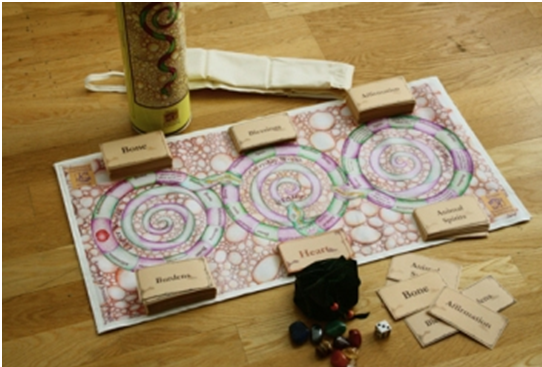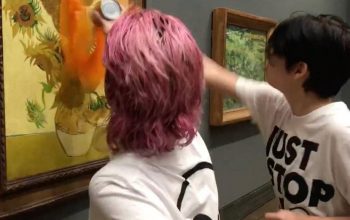by Michell Spoden
To many of us, the word “Shaman” quickly brings to mind thoughts of spirits and magic. However, the person we are talking today will tell you it is much more than what it appears or is the way it is popularized in media. Jennifer Powell is into the sixty-fourth year of her life. She is connected to art, healing, and social justice. She is now focusing on her art and doing the occasional Transpersonal Counseling sessions.
Michell: Jennifer, please tell us what we really mean by “Shaman”?
Jennifer: A Shaman is someone with a deep personal understanding of the interconnectedness of all things. This being something that informs their lives and their work, allowing them to draw on resources beyond their intellect. That could be anything from enlarged or extended perception to the direct connection with Animal Spirits or Guides.
Michell: How far back does this sort of practice go?
Jennifer: Shamanic practice as far as we can tell extends back to the beginning of human history and every culture has the echoes of their particular Shamanic tradition. Some cultures still maintain a strong Shamanic tradition from largely unbroken linage. While others like my own Celtic tradition have been largely obliterated from history.
Michell: You created a board game called “The Shaman Journey”. What led you to create a board game about this?
Jennifer: Well, actually it didn’t begin with me but with my husband at the time, Shane Powell. A friend had challenged him to create a game and he had been trying to come up with an idea while completing the arduous but loving task of typing up my thesis on ‘Shamanism in Contemporary Art’. So we set to work; however, I quickly realized that the potential was there to make it so much more than a game. This led to countless hours of contemplating the experience of years of counseling practice to look for ways to turn a game into a really useful tool.
Michell: You state this board game is a self-development tool, how is that?
Jennifer: I believe it helps us develop a much stronger sense of self by revealing our self to ourselves. By that I mean the reason we are so full of questions is we know so little about ourselves and our patterns of behavior. The game is played by each player asking a question; let us say your question is, “Why do I have so much trouble finding love in my life?” In the course of the game, you will come to understand what you really think about love and how that may block your desire. You might be directed to the past to find a difficulty there and in the pursuance of the journey you can come round to a more positive approach to the subject. If we are having difficulties in life we can be pretty sure that there is some fairly negative inner dialog in place to help foster those difficulties. The game not only helps you hear that inner dialog and correct it in relation to your question but helps to generate greater understanding of yourself as a whole.
Michell: I noticed that the trails on the board games are snakes of purple and green. Is this a symbol and if so, what does it mean?
Jennifer: Snake is a very powerful personal symbol for me and he is also my oldest Animal Spirit. He claimed me when I was quite tiny and oddly enough was a source of great torment to me for half a lifetime. However, working with him all these years I have developed an intense bond with the enormous and ancient reptile spirit and all my deepest and most powerful journeys have been with him. So I wanted that loving protective energy expressed in the game and the snake with tail in its mouth is the symbol for Oruoboros – the Hermetic World Serpent to encircle the three worlds on the board. To many people, the snake is a symbol of our capacity to regenerate and is ascribed the power to transmute poisons. I wanted both of those things attached to this game particularly changing the toxic trauma memories of the past into wisdom for the future. The color was an unconscious choice and might be simply aesthetic but they are the feminist colors and there I stand guilty as charged.
Michell: Can you please share some things about yourself that you want the viewers to know?
Jennifer: I guess I would like to share that I live a very quiet existence in a very small Australian country town. I have a strong community involvement and a lovely earthy life. I have a great passion for life and enormous curiosity for almost everything except sport. My art is now and has always been about the journey of the human spirit and I pour my whole heart into it. I have no sense of being old and still see life as dazzling with its possibilities which is why I still live in the fervent hope that one of my beautiful offspring will fill my hungry arms with grandbabies.
Michell: What is your motto in life?
Jennifer: Sorry Michell I had to have a giggle at that one – the oddest things popped into head when I was a child; I always thought I should have a motto but could never decide on one. When I was young, my mother was always telling me that I couldn’t carry the whole world on my shoulders but I thought if I could only love enough I could. I guess that is what I have lived by I try always to come to everything through love.
Michell: What are some of your long term goals?
Jennifer: You know I still have a few of those but I guess the biggest is to one day build myself an echo house; not that I am not grateful to rent the little house I live in, but I would adore the ultimate self-expression that creating your living space from the earth up.
Michell: And finally, how do you take failure in a goal or project in your life?
Jennifer: They say when one door closes another door opens however in my experience it requires you to let go of the old door first. Anger, disappointment and longing will block you in, you have to surrender returning to belief in the path so you are ready when your next mode of transport turns up. I have had to do that several times since this all began but my passion is undiminished and I am grateful for each step for the insight I acquire as a result.
Michell: Thank you so much for doing this interview with me.
About the Interviewer
Michell Spoden is the author of Stricken Yet Crowned and is also pursuing a transitional housing project for woman with an agricultural aspect. She has a degree in Business Science Administration and is finishing her bachelor’s in Project Management.


